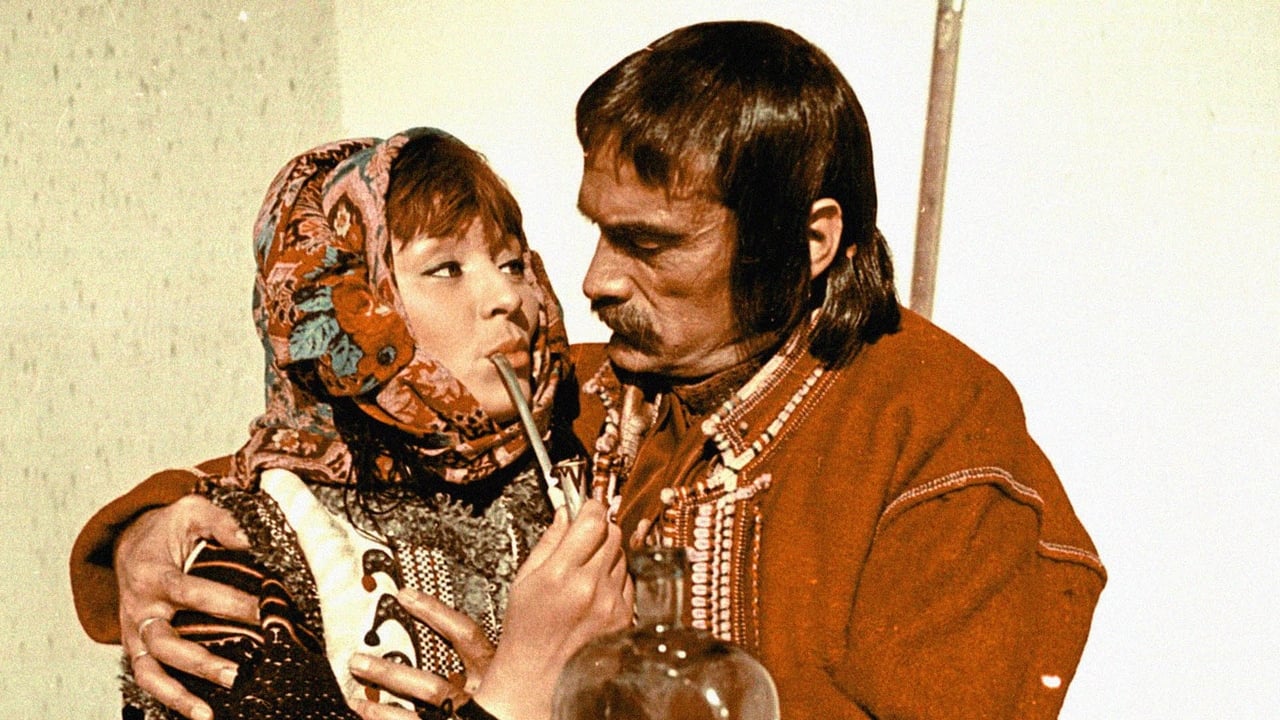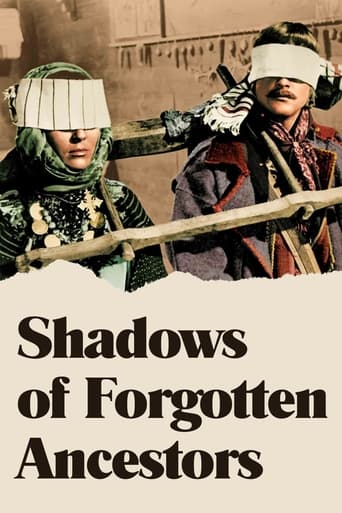



The movie's neither hopeful in contrived ways, nor hopeless in different contrived ways. Somehow it manages to be wonderful
View MoreThe plot isn't so bad, but the pace of storytelling is too slow which makes people bored. Certain moments are so obvious and unnecessary for the main plot. I would've fast-forwarded those moments if it was an online streaming. The ending looks like implying a sequel, not sure if this movie will get one
View MoreThe movie turns out to be a little better than the average. Starting from a romantic formula often seen in the cinema, it ends in the most predictable (and somewhat bland) way.
View MoreAll of these films share one commonality, that being a kind of emotional center that humanizes a cast of monsters.
View Morea trip in past. the life of a small community. a tragic love story. and the mixture of faith and magic. it is a Parajanov and that fact could define all. because the themes are the same. because the past and search of happiness are not different by others movies. because the old world becomes alive in each details. because the images are impressive and the soul of things real. a film like a fresco. or a fairy tale. or only a confession about life in few simple words. nothing new. nothing complicated. only a form of honesty under Soviet regime. using the Ukrainean language, use the tradition, ignoring political commands. that is all. a touching film about a lost universe. who could becomes not only an aesthetic experience. but a precious discovery about yourself's essence.
View MoreA tree falling at random and crushing a young man to death appropriately kicks off Sergei Parajanov's Shadows of Forgotten Ancestors, a film that episodically tells a story about the unsteady relationship between faith and chance as well as explores and celebrates the ancient culture that inhabited the Ukrainian portion of the Carpathian Mountains. The young man is the older brother of protagonist Ivan, whose continuous attempts from childhood through adulthood to live the kind of strong, honest Christian life of hard work, true love and marriage his culture fosters are repeatedly beset by occurrences that are equally unfortunate. While such tragedies - which include the demise of his sweetheart since childhood - dishearten the Job-like figure, he somehow manages to stay faithful, ultimately marrying a woman with beauty equal to that of his lost love. During their wedding ceremony, Ivan shockingly strips his bride naked of her traditional garb, an action that very well may be a tradition of his culture, but which I interpreted as Ivan lashing out at a way of life that has provided very little reward despite his efforts. Initially, it appears that with his marriage, Ivan's struggles have finally paid off, but it is soon revealed that he still pines for his lost love and that the couple is having no luck producing children. In a desperate act, Ivan's wife tries to remedy their problems with a Pagan fertility ritual, a move that makes her the target of a heretical neighbor's affections and which ultimately reveals her true colors as equally heretical. The two enter into an affair, made all the more painful for Ivan as they display their affections in plain sight as if he does not exist. Like the falling tree that kicks off the story, the affair brings it - as well as Ivan's woeful life - to a close, an ending that includes the bittersweet moments of Ivan envisioning a meeting with his young love in the afterlife as well as the kind of robust group of kids he had hoped to raise observing his contrastingly joyous funeral ceremony.Speaking of contrasts, the story of Ivan's unfortunate journey is enveloped by a celebration of ancient Ukrainian culture. This includes authentic portrayals of its dance rituals, work habits and religious ceremonies, made all the more authentic via traditional Ukrainian music as well as production design that highlights the Carpathian region's natural beauty and color. At first, all of this celebration surrounding a life that offers little reason to celebrate made the film appear oddly schizophrenic, but I soon realized how well it emphasized Ivan's tragedy, especially since all of these cultural traditions - the religious ones in particular - seemed to be serving everyone perfectly fine except for him. Parajanov appropriately directs the celebratory scenes with camera work resembling that of Godard, or better yet, Evil Dead-era Sam Raimi, while Ivan's story mostly consists of stark stillness. However, Parajanov's direction includes the unfortunate tendency to change scenes at a breakneck clip, and the intentions of such scenes do not become entirely clear until much later. Regardless, Ancestors is a simple story beautifully told, and while it can ultimately be interpreted as an exploration of faith gone wrong, that it does so without belittling the act of having faith is admirable and refreshing.
View MoreSergei Parajanov's Teni Zabytykh Predkov aka Shadows of Forgotten Ancestors (1964) is original, surprising film, baroque in style and extraordinary fast. It uses elements of animation (blood streams turn into flying red horses), changes from B/W to color, and, is without a doubt experimental, ahead if its time cinema. You can practically feel dizziness from the rapid and unusual camera angles and you will be mesmerized by the colors of the traditional costumes, sounds of the folk songs, and by the sheer magic of Paradjanov's world. Made over 40 years ago it is still impressive. I can imagine how much ahead of time it was upon releasing.The story about Guzul guy Ivan who loved a girl, lost her forever, suffered deeply, tried to forget her by marrying another woman, could not make that woman happy and was ultimately betrayed by her, is told in incredibly triumphant exuberant, and poetic way. The story of star-crossed lovers has been explored in art, literature, and cinema many times, and it is not surprising then the first half of the film sounds as rephrases of "Romeo and Juliette". But Shadows is interesting not only because of the story. Strange, but compelling mixture of Christianity and pagan rituals of Carpathian bewitched mountaineers, gives to the film special dimension. There are not many directors who would be able to create the ethnographic cinema which is at the same time gripping drama/legend/love story. Parajanov -- one of such directors and his film looks feels absolutely seamless, wholesome, and organic.The DVD which I saw includes among the bonus features the documentary "Andrei Tarkovsky and Sergei Parajanov. The Islands". The 40 minutes long film explores the similarities in the work of two very different but outstanding artists who deeply loved and admired each other's Art. Tarkovsky said that Parajanov was absolutely free in the way he expressed himself in his films, nobody could compare with him in this freedom of expression, lust for life, and readiness to go to the end in order to make film according his vision. Parajanov, in turn, thought of Tarkovsky as genius from the very first feature film, Ivanovo Detstvo. The film included the interviews with both Artists' friends and figures of culture from the former USSR. The most valuable part of the film is the montage of the clips from the films of both directors. Seeing them next to each other, makes a stunning viewing. You can't help noticing how different yet close in their vision and expression they were. I highly recommend watching another bonus feature, Photo album in Memory of Sergey Paradjanov. Film and Collage. It shows the photographs from the different periods of the Artist's life, starting with him as a young boy, then - handsome artistic man, and finally resembling a very wise and very sad Santa Claus. The most interesting are the examples of Parajanov's collages, true works of art.
View MoreWell, i don't really think this movie is the masterpiece most critics say it is, first of all because, according to me, you can hardly feel a sort of empathy towards the two main characters, their acting is quite poor and they always seem pretty distant, like if they were images more than characters. Moreover, the extreme beauty of some images, the camera "overwork" compared to the poverty of the acting and the lack of in-depth of the characters, makes the film look magnificent but also formalist, "manieriste" at the same time. Very interesting to watch, but most of the time emotionally dull and boring.. As a consequence, even the "maestria" of the camera get sometimes annoying.. (i'm not a native English-speaker... i wish i could tell it in better words..)
View More